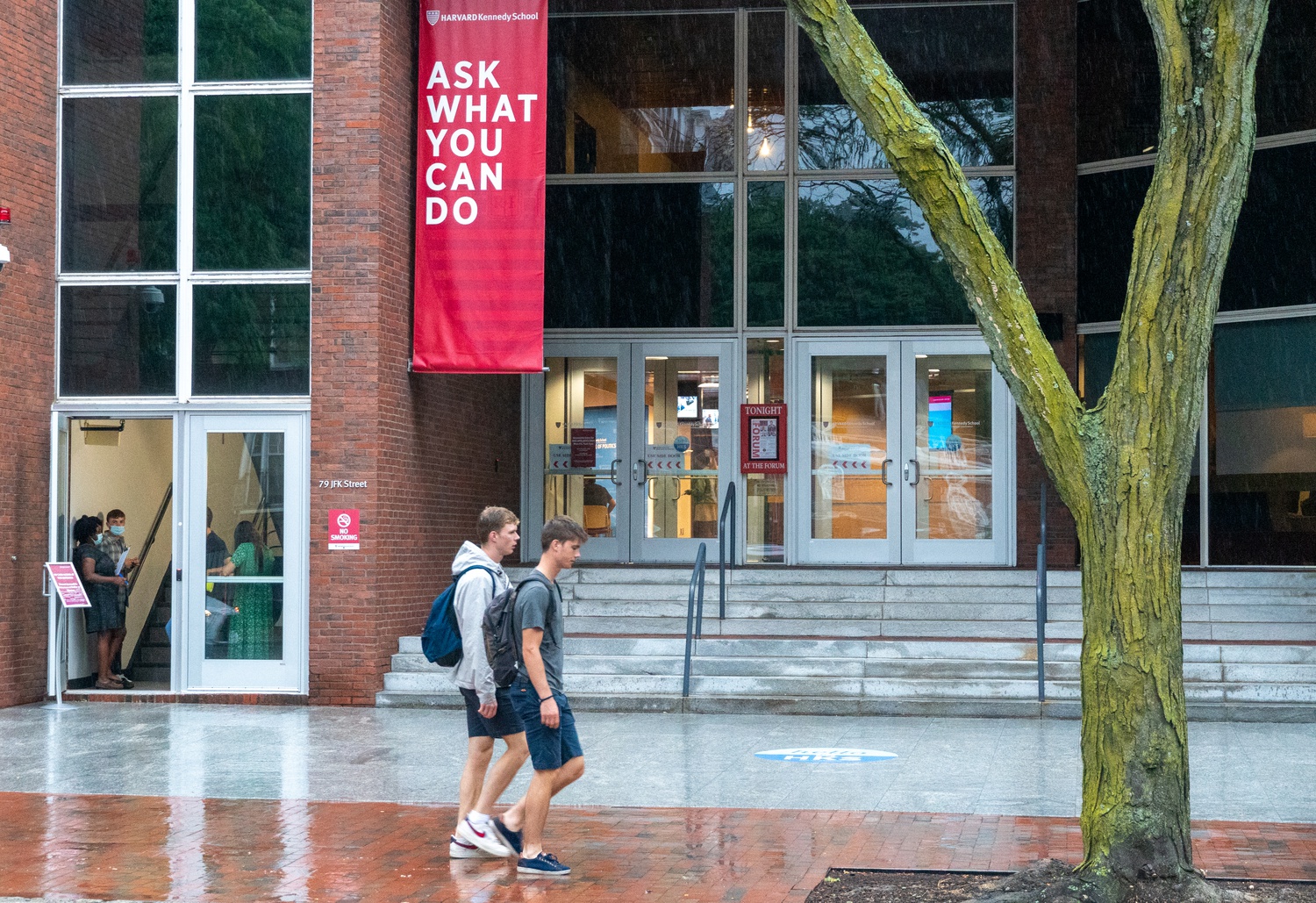
News
Summers Will Not Finish Semester of Teaching as Harvard Investigates Epstein Ties

News
Harvard College Students Report Favoring Divestment from Israel in HUA Survey

News
‘He Should Resign’: Harvard Undergrads Take Hard Line Against Summers Over Epstein Scandal

News
Harvard To Launch New Investigation Into Epstein’s Ties to Summers, Other University Affiliates

News
Harvard Students To Vote on Divestment From Israel in Inaugural HUA Election Survey
HKS Adopts Non-Attribution Policy, Announces Constructive Conversations Initiative

The Candid and Constructive Conversations task force — a group of Harvard Kennedy School affiliates charged with developing a blueprint for open dialogue — announced the school would adopt a non-attribution policy as part of a slate of new rules and programming aimed at fostering conversations on divisive issues.
The task force’s new initiatives — which were announced in an email to HKS affiliates last week — also include several experimental classes that bar the use of phones, a series of facilitated discussions on controversial issues, a new “Libraries and Democracy Initiative,” and an AI-assisted chatbot to coach users in “receptive listening.”
The policy changes come as the Kennedy School ramps up its programming on the upcoming 2024 U.S. elections and as the University faces national scrutiny over free speech on campus after a year marked by protests over the ongoing war in Gaza.
HKS Academic Dean of Faculty Development Erica Chenoweth, who served as co-chair of the task force alongside HKS professor Archon Fung, wrote that they are looking “forward to rising to the opportunity to learn, lead, and serve in polarized times” in the email.
“The team sees creating more space to talk about these topics as essential to our work,” Chenoweth wrote in a statement to The Crimson. “We are experimenting with ways to build cohorts of students, faculty, and staff who want to lead on these issues going forward.”
Former HKS Dean Douglas W. Elmendorf launched the task force in fall 2022 to review norms for conversations about divisive issues at other Harvard schools and peer institutions and recommend policies that could foster more productive dialogue at the Kennedy School.
The working group — led by Chenoweth — released its preliminary findings in November 2023 after six listening sessions and a school-wide survey.
In the survey, the 14-member task force found that 25 percent of faculty and staff and 50 percent of student respondents “reported concern of reputational or relational harm” as key factors that discouraged them from voicing their opinions in public — an issue the school’s new non-attribution policy appears to target.
“We want our students to feel like they can lead and make a difference on some of the toughest issues of our lifetimes,” Chenoweth wrote. “To do that, it will really help to be able to convene, facilitate, participate in, and recover from difficult conversations.”
While the newly-announced policies largely mirror the recommendations published by the working group in November, a few proposed policies have yet to be adopted, including a recommendation for a new application essay on how students handle and learn from disagreement.
Though newly-appointed HKS Dean Jeremy M. Weinstein’s term began on July 1 — eight months after the working group published its initial report — Chenoweth said Weinstein has been “extremely supportive” of the CCC’s work, especially its implementation in the run up to the U.S. elections.
“Dean Weinstein was enthusiastic about applying CCC activities to this consequential year of elections,” they wrote.
In an email welcoming HKS affiliates to the fall term, Weinstein praised the task force’s work over the summer and said their recommendations would be critical in navigating what he called “not an easy time in the world.”
“The ability to engage across difference is a crucial skill for policymakers and public leaders—and for everyone in this community who cares about having an impact in the world,” Weinstein wrote.
The Kennedy School’s effort to promote free speech on its campus mirrors the University’s own initiative to promote open dialogue — efforts with which the CCC task force will be closely affiliated.
Chenoweth wrote that the upcoming semester at the Kennedy School amid ongoing elections and conflicts worldwide “might provide something of a testing ground of our progress as a community.”
“Given the fact that 2024 is the ‘year of elections’ around the world, and that many policy conversations right now are deeply polarized, this fall gives us an opportunity to apply what we have learned in many respects,” they added.
—Staff writer William C. Mao can be reached at william.mao@thecrimson.com. Follow him on X @williamcmao.
—Staff writer Dhruv T. Patel can be reached at dhruv.patel@thecrimson.com. Follow him on X @dhruvtkpatel.
Want to keep up with breaking news? Subscribe to our email newsletter.
